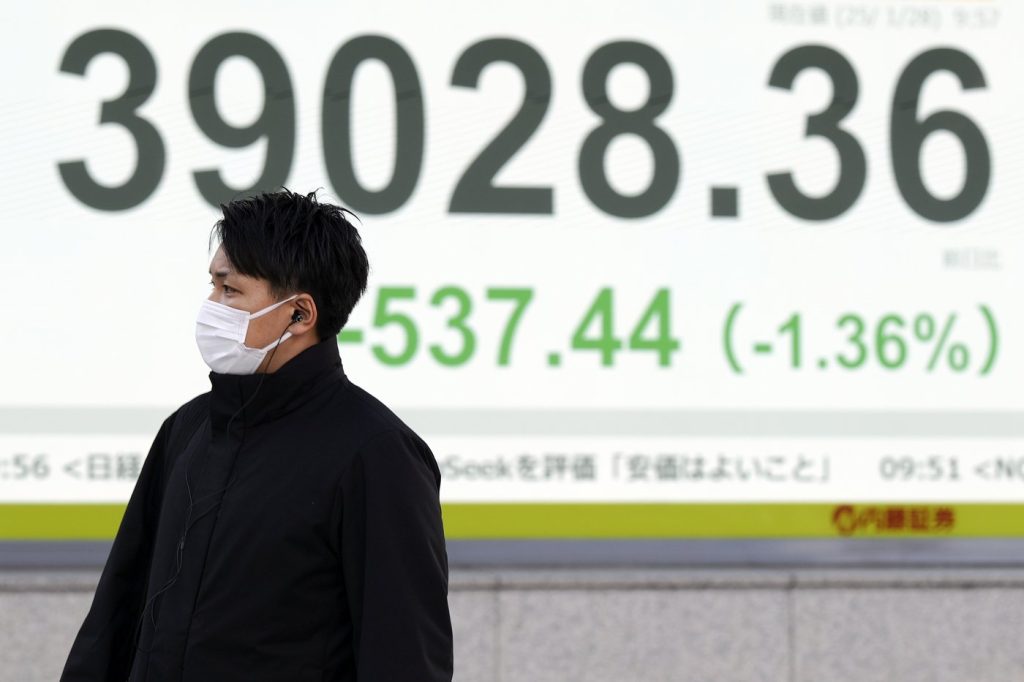TOKYO (AP) — Asian shares exhibited mixed performance on Tuesday as Lunar New Year trading remained thin, following a substantial fall in the U.S. tech sector. This downturn was provoked by concerns surrounding the artificial intelligence (AI) market after a Chinese competitor raised questions about the industry's growth prospects.
Japan's benchmark index, the Nikkei 225, declined by 0.9% to close at 39,214.19. In Australia, the S&P/ASX 200 showed little movement, edging up less than 0.1% to reach 8,411.70. Conversely, Hong Kong's Hang Seng index rose by 0.2% to 20,236.13. Meanwhile, markets in South Korea, Shanghai, and several other areas were closed for holidays, contributing to the overall thin trading conditions.
Within Japan's technology sector, SoftBank Group Corp. experienced a significant decline, with its stock plummeting by 10%. Hitachi Ltd. also faced challenges, losing 4%. However, Fujitsu and Sony Corp. managed to recover during the trading session. On the other hand, Tokyo Electron, a prominent computer chip manufacturer, fell sharply by 7.6%.
In an unexpected twist, Fuji Media Holdings surged nearly 9% in the morning session, bouncing back after a lengthy news conference that lasted over ten hours amid a scandal involving one of its anchorwomen. This fluctuation in Fuji's stock price followed a series of Japanese magazine reports detailing the controversy, which culminated in the retirement announcement of a male star linked to the issue.
Across the Pacific, the U.S. stock market faced substantial losses, with the S&P 500 dropping 1.5% to 6,012.28 due to a staggering 16.9% plummet in Nvidia shares. This downturn affected other major tech stocks, leading the Nasdaq composite to a 3.1% loss, amounting to its worst performance in over a month. Despite the tech sector struggles, the Dow Jones Industrial Average managed to rise by 0.7% to 44,713.58, indicating better overall market resilience apart from AI-related stocks.
The downturn in AI stocks was largely triggered by an announcement from Chinese AI firm DeepSeek, which introduced a large language model capable of competing with its U.S. counterparts but potentially at a significantly lower cost. DeepSeek's application quickly climbed to the top of the charts for free apps on Apple's App Store, raising eyebrows about the implications of its success, especially in light of restrictions placed on Chinese access to top AI chips by the U.S. government.
Analysts remain cautious about the potential impact of DeepSeek's developments on the broader AI economy, which includes a diverse ecosystem from semiconductor manufacturers to utilities supplying power to extensive data centers. Dan Ives, an analyst at Wedbush Securities, noted that skepticism endures concerning how DeepSeek navigated chip restrictions, emphasizing the need for clarity on the chips utilized.
The swift decline in AI stock values marks a notable shift for these previous market winners, which had benefited from heightened investor enthusiasm around vast economic transformations fueled by AI investments. Before this recent plunge, Nvidia's stock, for instance, soared from below $20 to over $140 in under two years, showcasing a dramatic rise framed by critiques of inflated valuations.
A compact group of seven influential companies, including Alphabet, Amazon, Apple, Meta Platforms, Microsoft, Nvidia, and Tesla, has been key to S&P 500 returns, contributing to over half of its total growth last year. Their significant market presence underscores the substantial influence they hold over major stock indexes, evidencing how such downturns affect broader market sentiments.
Looking ahead, market participants are poised for forthcoming earnings reports from giants like Apple, Meta Platforms, Microsoft, and Tesla, which could further shape market trends.
In the energy sector, benchmark U.S. crude oil traded at $73.12 per barrel, a decrease of $0.05, while Brent crude, the global standard, shed $0.01 to reach $76.17 per barrel. Currency trading reflected a stronger U.S. dollar, which increased to 155.54 Japanese yen from 154.51, while the euro dipped to $1.0434 from $1.0493.










